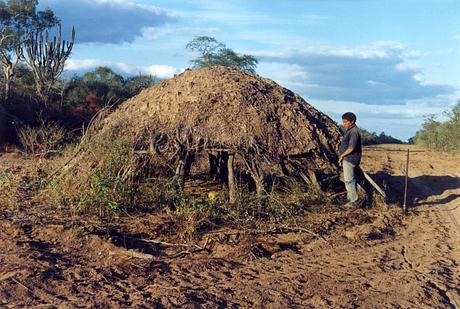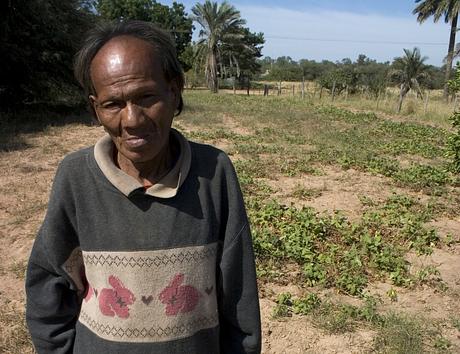Before contact

This house belonged to an uncontacted Ayoreo family. It was discovered as it lay right in the path of a bulldozer clearing their forest for cattle ranching. The next day the bulldozer returned and flattened the house. The Ayoreo’s fate is unknown.
The constant incursions of outsiders meant Parojnai and his family constantly had to move camp. Each sudden move meant the loss of the crops they had planted, and often their precious possessions such as cooking pots and tools.
Parojnai: ‘We heard the noise of the bulldozer. We had to run away immediately, but luckily we were able to take all our things.
‘We spent the night up in the forest, but we had to get up before dawn because we were afraid, and as we were getting up we heard the noise of the bulldozer again.
‘It started to come closer to us. My wife had to leave the fruit of the najnuñane (carob tree) which she had already picked. We had to leave some other things as well to run faster because of the bulldozer.
 © Survival
© SurvivalParojnai Picanerai, Ayoreo-Totobiegosode man, in 2007. He died of tuberculosis a year later.
‘We ran from one place to another. It looked like the bulldozer was following us. I had to leave my tools, my bow, my rope to run faster. At last, the bulldozer left in another direction. When I realised that the bulldozer had gone in another direction, I found a trunk with a beehive in it, and I took the honey.
‘We thought that the bulldozer could see us. We had planted many crops in the garden [melon, beans, pumpkin and corn] because it was summer time. We thought that the bulldozer had seen our garden and came to eat the fruit – and to eat us too. The bulldozer opened a path up right beside our garden, that’s why we were so scared of it.
‘We have always seen airplanes, but we did not know that it was something useful of the cojñone [white people, literally strange people]. We also saw long clouds behind the plane which frightened us, because we thought that something might fall on us. When we saw these big planes with this white smoke behind, we thought they were stars.’
Sign up to the mailing list
Our amazing network of supporters and activists have played a pivotal role in everything we’ve achieved over the past 50 years. Sign up now for updates and actions.
